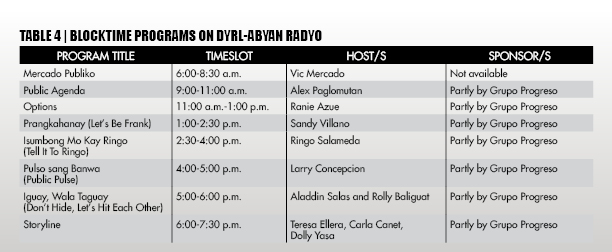Mixed blessing, or mixed curse?“Blocktiming” in Bacolod City

Over at dyRL-Abyan Radyo, Grupo Progreso has leased almost 60 percent of its broadcast hours starting with the program of Paglomutan and ending with the early evening slot of Aladdin Salas and Rolly Baliguat, two-thirds of the group that was once known as the “Borloloy Gang.” The third member, Joel Madalag, died several years ago.
Radio, Interactive Television Network (RITVN) first leased the block in 2007 and the contract was signed by Ernesta Guillem, wife of Ed Guillem, a Leonardia ally who also ran but lost as a councilor in the last elections.
“It was the mayor’s cousin, Tutay Corral, who talked to me about the leasing of time,” Brillantes said.
Prior to 2007, dyRL had already been leasing time to politicians but way back then “anyone who wants to lease can do so unlike now that it seems to have gone to just one political group.”
Brillantes cannot do anything about this seeming wholesale transaction because its negotiations were held first with the Manila office of Radyo Pilipino Corporation and “I was just told to expect some people who would be coming to my office to finalize the contract.”
The first transaction proved to be better than the succeeding ones because Brillantes was able to sign a memorandum of agreement that would bind the on-air performers to adhere to some station policies and the KBP’s Radio Code.
“I wanted to make sure that they would still practice good and ethical broadcasting.”
Aside from that, the station was earning around P200,000 a month for the airtime lease.
The contract with RITVN that started in August 2007 proved to be problematic in terms of payment and was cancelled after only several months although it was supposed to last a year. Another outfit, BF Ventures, took over the lease, but RITVN is now planning to take over the blocktime again, Brillantes said.
RITVN is now represented by Eddie Coo, former station manager of dyWB Bombo Radyo-Bacolod, and is finalizing the terms and conditions of its contract and a memorandum of agreement with dyRL.
Coo will not discuss details about who will fund RITVN, but Paglomutan confirmed that currently their blocktime is “partly paid for” by Grupo Progreso.
“The funds are coming from the Grupo Progreso members, and that would include Mayor Leonardia, Vice Mayor Sayson and others; I don’t think that there are public funds used for the purpose, that is my understanding,” he said.
Program content and quality
KBP president and Manila Broadcasting Company head Ruperto Nicdao once referred to programs run by politicians as “campaign wolves.”
During a forum on “Media and the May 14 Elections” organized by the Center for Media Freedom & Responsibility (CMFR) and the Joaquin Roces Foundation in May 2001, Nicdao clarified that “…programs run by politicians are not necessarily campaign wolves in sheep’s clothing; there are countless such programs that serve as legitimate if not commendable avenues of public service.”
He also outlined one important duty of radio and television, which is not only to provide candidates with a far-reaching platform to convince voters but also to perform “…a sworn duty to inform, educate, and empower the voting public.”
Most blocktime programs are like the usual news and public affairs or personality programs in the dominant media, except that listeners do not know who funds these programs, and it is generally agreed that there is a lack of adherence to journalistic standards.
Such a concern was expressed by journalists themselves during a January 2010 roundtable conference organized by CMFR during which print and digital journalists urged the KBP to compel its member-organizations to clearly identify which programs are paid for by political candidates.
“If it is paid for by a local government office, then the people should know that it is taxpayers’ money that is being spent, in clear violation of the electoral law,” the group said.
KBP’s Ferrer agreed that there should be full disclosure about who funds a blocktime program. Not only is it the ethical thing to do, it is also in compliance with the KBP Radio Code.
The practice of radio stations, however, is simply to air a disclaimer to provide blanket of protection for management when a blocktimer is accused of slander, for example, although that is not supposed to be the case, he pointed out.
<<Previous Page || Next Page>>
Leave a Reply